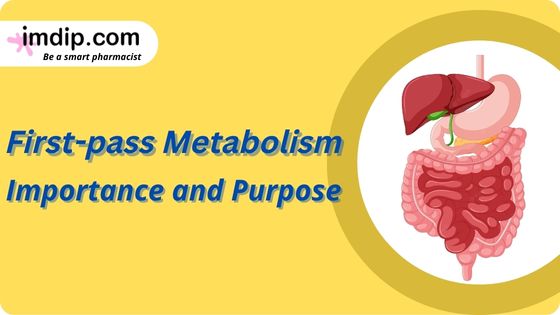Before we discuss first-pass metabolism you must know the general process of drug metabolism. Generally, a drug is administered orally then it's absorbed from the gastrointestinal tract and it's transported via the portal vein to the liver, where it is metabolized. As a result, in some cases, only a tiny amount of the active drug reaches the systemic circulation and its targeted organ.
Due to a very small amount of drug reach to the systemic circulation and the targeted organ (where it has to work for treatment), the potency of the drug is not achieved as expected.
Here the concept of first-pass metabolism is important, to deliver the proper amount of drug to the systemic circulation and the targeted organ to achieve the maximum potency of the drug.
I hope you clearly understand the importance and purpose of first-pass metabolism.
The word first-pass metabolism is also known as first-pass effect or pre-systemic metabolism.

First-pass Metabolism- Importance and Purpose
Definition of first-pass metabolism
First-pass metabolism is an important process that occurs in the liver after the oral administration of drugs. It refers to the metabolism of a drug that occurs before it reaches the systemic circulation, as it passes through the liver via the portal vein. This process has significant implications for the efficacy and safety of drugs.During first-pass metabolism, enzymes in the liver break down a significant proportion of the drug before it can enter the bloodstream. This can lead to a reduction in the amount of active drug that reaches the target site in the body, potentially reducing the efficacy of the drug. In some cases, the metabolites produced during first-pass metabolism can be more active than the parent drug, leading to increased efficacy or toxicity.
The extent of first-pass metabolism varies widely depending on the drug and the individual. Factors that can influence first-pass metabolism include genetics, age, liver function, and other drugs that are being taken concurrently.
One of the ways that first-pass metabolism can be bypassed is by administering drugs through alternative routes, such as intravenous injection or transdermal patches. These routes of administration allow drugs to bypass the liver and enter the systemic circulation directly, increasing their bioavailability and reducing the potential for first-pass metabolism.
Another strategy for overcoming the effects of first-pass metabolism is to use prodrugs. Prodrugs are inactive compounds that are metabolized in the body to produce the active drug. By designing prodrugs that are resistant to first-pass metabolism, it is possible to increase the amount of active drug that reaches the target site.
Importance of first-pass metabolism
- Regulation of drug bioavailability: First-pass metabolism plays an important role in regulating the bioavailability of drugs. The liver enzymes that break down drugs during first-pass metabolism can reduce the amount of active drug that enters systemic circulation, which can affect the drug's efficacy and safety.
- Drug metabolism and elimination: The liver is the primary organ responsible for drug metabolism and elimination, and first-pass metabolism is a crucial step in this process. By breaking down drugs before they enter the bloodstream, the liver can help to detoxify potentially harmful compounds and eliminate them from the body.
- Impact on drug dosing: Understanding the extent and mechanisms of first-pass metabolism is critical for optimizing drug dosing. If a drug undergoes significant first-pass metabolism, it may be necessary to adjust the dose or use alternative routes of administration to achieve the desired therapeutic effect.
- Potential for drug interactions: First-pass metabolism can be influenced by other drugs that are being taken concurrently. Some drugs can inhibit or induce the liver enzymes responsible for first-pass metabolism, leading to increased or decreased bioavailability of other drugs.
- Prodrug design: Prodrugs are inactive compounds that are metabolized in the body to produce the active drug. By designing prodrugs that are resistant to first-pass metabolism, it is possible to increase the amount of active drug that reaches the target site and improve therapeutic efficacy.
- Role in drug development: First-pass metabolism is an important consideration in drug development, particularly for orally administered drugs. Understanding the potential impact of first-pass metabolism on a drug's pharmacokinetics and pharmacodynamics can help to optimize drug design and improve clinical outcomes.
References: First Pass Effect












.png)
